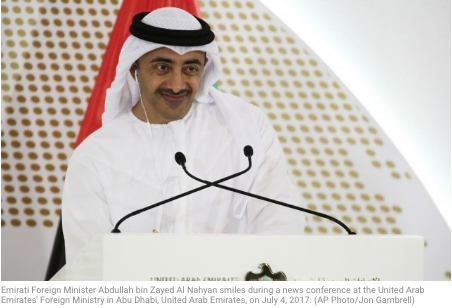
The Times of Israel
June 25, 2020
PM says collaboration on research, tech is ‘result of extended, intensive contacts’; report says Mossad chief helped broker new agreement, which may include opening of missions

Israel and the United Arab Emirates are set to publicly announce a new cooperative effort against the coronavirus pandemic, Prime Minister Benjamin Netanyahu said Thursday.
Speaking at a graduation ceremony for the Israel Air Force’s pilot course, Netanyahu said: “The health ministers of the United Arab Emirates and Israel will imminently announce cooperation in fighting the coronavirus. This cooperation will be expressed in research and development [and] technology in areas that will improve health security throughout the region.”
Netanyahu said the agreement was “the result of extensive and intensive contacts in recent months and will bring a blessing to many in our region.”
In a speech that also focused on threats posed to Israel from Iran, Syria and Lebanon, he added: “The stronger we are, the more powerful we are — we deter our enemies and bring our friends closer.”
Channel 12 news reported that Mossad chief Yossi Cohen helped broker the new agreement. The report said the deal may include the opening of mutual missions in both countries.
It also said the plan was to start with cooperation on the virus and potentially expand to other areas later on.
Jerusalem and Abu Dhabi have no formal diplomatic ties, but have been coopering increasingly openly after years of rumored back-channel discussions between them over their mutual enmity of Iran.
While not acknowledging Israel diplomatically, Emirati officials have in recent years allowed Israeli officials to visit and the Israeli national anthem was played after an athlete won gold in an Abu Dhabi judo tournament. Israel also has a small mission representing its interests at the International Renewable Energy Agency in Abu Dhabi.
In May and June the UAE’s Etihad Airlines landed its first two direct flights from Abu Dhabi to Israel, carrying shipments of medical supplies to assist the Palestinians in coping with the coronavirus pandemic. The Palestinian Authority rejected the aid, saying it was an excuse for a step toward the normalization of ties between Israel and the Gulf states.
Last week, the UAE’s Minister of State for Foreign Affairs Anwar Gargash called for increased cooperation with Israel. He said there was no reason not to cooperate with Israel on efforts to bring medical aid to Palestinians suffering from the coronavirus pandemic.
Last month a senior official at one of the country’s leading hospitals said several states in the Arab Gulf were actively engaged in cooperation with Israel’s health system.
Top representatives from Bahrain and the UAE have been in regular touch with the Sheba Medical Center since before the current health crisis, said Yoel Hareven, who heads the hospital’s international division. But in March, a high-ranking member of the Emirati royal family privately visited the hospital in Ramat Gan and has since remained in weekly contact, Hareven said.
The Gulf states recognize how powerful and innovative Israel’s health sector is and are increasingly willing to say so openly, Hareven added, calling it “the beginning of a very fascinating journey — for the entire Israeli public, not only for the medical field or Sheba Medical Center.”
Rabbi Marc Schneier, who has extensive ties in the Gulf and helped establish the connection between Sheba and the Bahraini government, said many decision-makers in the Gulf envision a partnership that would marry the Arab countries’ economic wherewithal with Israel’s brain trust, he said.
“I’ve heard this repeatedly from my friends in the Gulf: COVID-19 is a real opportunity for joint cooperation.”
Earlier this month, UAE Minister of State Yousef Al-Otaiba, who is also the country’s ambassador to the US, wrote a first-ever op-ed for an Israeli newspaper by a Gulf diplomat, in which he acknowledged that Israel and much of the Arab world have grown closer in recent years and expressed hope that such cooperation in a wide range of areas would deepen in the future.
But he warned Jerusalem against its plan to unilaterally annex parts of the West Bank, saying such a move would destroy any hopes for further rapprochement between the Jewish state and the Arab world.
Al-Otaiba noted that much of the Arab world “would like to believe Israel is an opportunity, not an enemy. We face too many common dangers and see the great potential of warmer ties. Israel’s decision on annexation will be an unmistakable signal of whether it sees it the same way.”
Copyright © 2025 Foundation For Ethnic Understanding. All rights reserved. | Privacy Policy